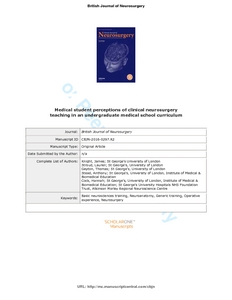Knight, J; Stroud, L; Geyton, T; Stead, A; Cock, HR
(2017)
Medical student perceptions of clinical neurosurgery teaching in an undergraduate medical school curriculum.
British Journal of Neurosurgery, 31 (6).
pp. 727-730.
ISSN 1360-046X
https://doi.org/10.1080/02688697.2017.1335856
SGUL Authors: Cock, Hannah Rutherford
![[img]](https://openaccess.sgul.ac.uk/108875/1.hassmallThumbnailVersion/CBJN-2016-0297r2%20Neurosurgical%20Teaching%20Accepted.pdf)  Preview |
|
PDF
Accepted Version
Available under License ["licenses_description_publisher" not defined].
Download (373kB)
| Preview
|
Abstract
Aim: The aim of this study was to evaluate undergraduate medical student perceptions as to the value of different types of neurosurgical teaching to their general neuroscience education, delivered in the penultimate year of a UK medical school.
Methods: We surveyed penultimate-year medical students at St George’s Hospital Medical School, University of London (SGUL), who were undertaking their clinical neuroscience attachment from August 2014 to July 2015. A questionnaire comprising closed Likert scale questions and an open question inviting participants to comment freely was used to assess student perception about the value of Neurosurgical sessions within their overall neuroscience
education.
Results: Of the 316 students in the year we surveyed 247 (78.2%), of whom 201 responded (response rate 81.4%). On average, 82.8% of students either agreed or strongly agreed that neurosurgical teaching sessions made a valuable contribution to their learning. In particular, lectures by neurosurgeons, clinical teaching on the Glasgow Coma Scale in neuro-ITU, bedside teaching and neurosurgical clinics were considered the most beneficial. The majority of students felt the sessions improved their understanding of neurological examination, signs, and ‘red-flags’. The sessions were also beneficial for learning neuro-imaging and understanding of neurosurgical emergencies. Over two thirds felt that theatre sessions were beneficial, significantly more so amongst students invited to ‘scrub-in’.
Conclusion: Students rated neurosurgical sessions highly and valued the contribution they made not only to their learning of neurosurgical conditions and emergencies, but also to their learning of general neurology and clinical neurosciences overall. Student perceived learning from theatre sessions was significantly correlated with whether or not the student had been invited to ‘scrub-in’. Expert neurosurgical teaching can make a valuable, and arguably essential contribution to the undergraduate medical curriculum.
Statistics
Item downloaded times since 25 May 2017.
Actions (login required)
 |
Edit Item |


